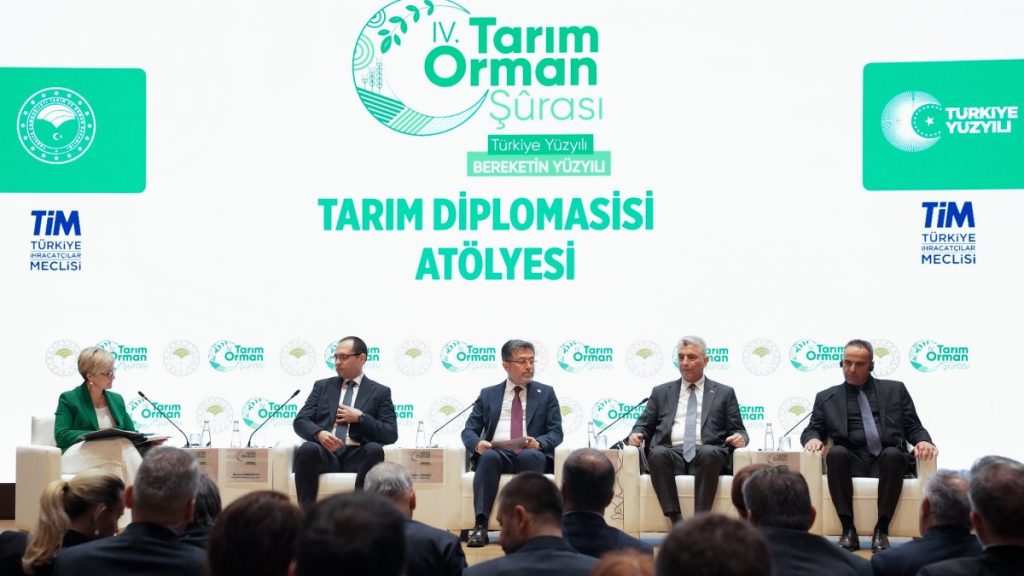The United Nations World Food Programme (WFP) has approached Türkiye with a proposal to establish the country as a “strategic stockpile center” for regional and global food reserves, Agriculture and Forestry Minister İbrahim Yumaklı announced on Monday.
At the Agricultural Diplomacy Workshop held during the 4th Agriculture and Forestry Council in the capital Ankara, Yumaklı emphasized Türkiye’s unique geopolitical position as a major advantage for rapid food distribution to crisis-hit areas.
“Thanks to our proximity to regions facing instability, we can ensure food reaches those in need swiftly. This geographic strength positions us ideally to serve as a strategic stock center,” he said. “The evaluation process with the Foreign Ministry has been completed, and the government awaits final approval,” Yumaklı added.
The workshop featured key officials, including Trade Minister Ömer Bolat, Azerbaijani Agriculture Minister Majnun Mammadov and Syrian Agriculture and Agrarian Reform Minister Amjad Bader. The session explored the evolving role of agricultural diplomacy in the post-pandemic and post-conflict world.
Yumaklı underlined that agriculture and food security have become increasingly strategic components of international relations, particularly in light of the COVID-19 pandemic and the ongoing Russia-Ukraine war.
“Today, 730 million people face hunger worldwide,” the minister noted. “We consider agriculture a strategic instrument in foreign policy. Our collaborations range from the Balkans to Africa and the Americas to East Asia, supporting small-scale enterprises, promoting climate-resilient practices and ensuring efficient water use.”
He cited the Black Sea Grain Initiative as a landmark example of multilateral agricultural diplomacy, reinforcing the idea that “no peace is possible without food security.”
Bolat echoed Yumaklı’s sentiments, highlighting Türkiye’s growing influence in global agricultural exports. “Türkiye ranked first in agricultural production in Europe and increased its share in global agricultural exports to 1.5%, reaching $31 billion in 2023,” he said.
Bolat stressed the importance of balancing domestic market needs while expanding export partnerships through bilateral and multilateral agreements.
“We remain in close coordination with the Agriculture Ministry to ensure a sustainable and balanced food supply,” he added.
Post-conflict reforms
Azerbaijan’s Minister Mammadov emphasized the need to uplift farmers’ living standards to effectively implement agricultural diplomacy, especially in the post-conflict Karabakh region. He also underscored the importance of modernizing agricultural policies in light of climate change and health challenges.
Meanwhile, Bader said years of conflict have left the country’s agricultural sector in ruins. “We need to review our natural resources, develop a solid database, and focus on training and investment, particularly in water management. We’re open to cooperation with Turkish firms,” he said.
Officials stressed that the WFP’s proposal does not necessarily mean physically storing all food stocks in Türkiye. Instead, the country would serve as a secure transit hub, leveraging its location to facilitate global food trade and humanitarian aid.
Türkiye’s proximity to key regions like Yemen, Afghanistan, Pakistan, eastern Africa, Ukraine and Palestine, along with its diplomatic influence and logistical capacity, makes it an ideal candidate for this role.
Global challenges
A separate session titled “The Impact of Agricultural Diplomacy on International Trade,” moderated by associate professor Şuay Nilhan Açıkalın of Ankara Hacı Bayram Veli University, brought together key stakeholders from various ministries. The session emphasized how agricultural diplomacy is evolving to address not only trade concerns but also complex global issues such as disinformation and artificial intelligence.
Speakers, including Deputy Minister of Agriculture and Forestry Ahmet Bağcı, Deputy Trade Minister Volkan Ağar, Aylin Sekizkök, director general of international economic affairs at the Ministry of Foreign Affairs and ambassador, and Melise Tokgöz Mutlu, board member of the Turkish Exporters Assembly (TIM) and chair of the Agricultural Board, pointed out the urgent need to combat the misuse of digital platforms and AI-generated misinformation that can destabilize agricultural markets and threaten food security.
The panel called for international cooperation and ethical standards in agricultural communication, stressing that data-driven, transparent dialogue is critical in maintaining public trust and ensuring accurate information flows across borders.


